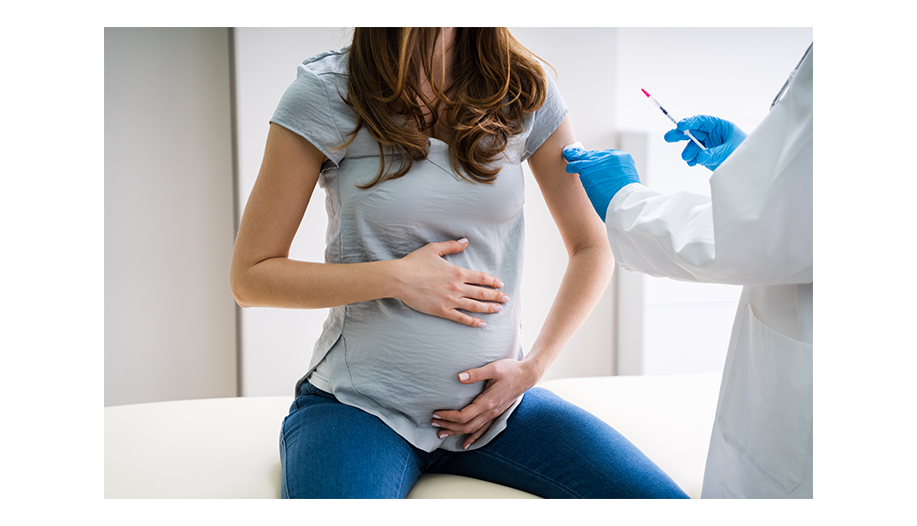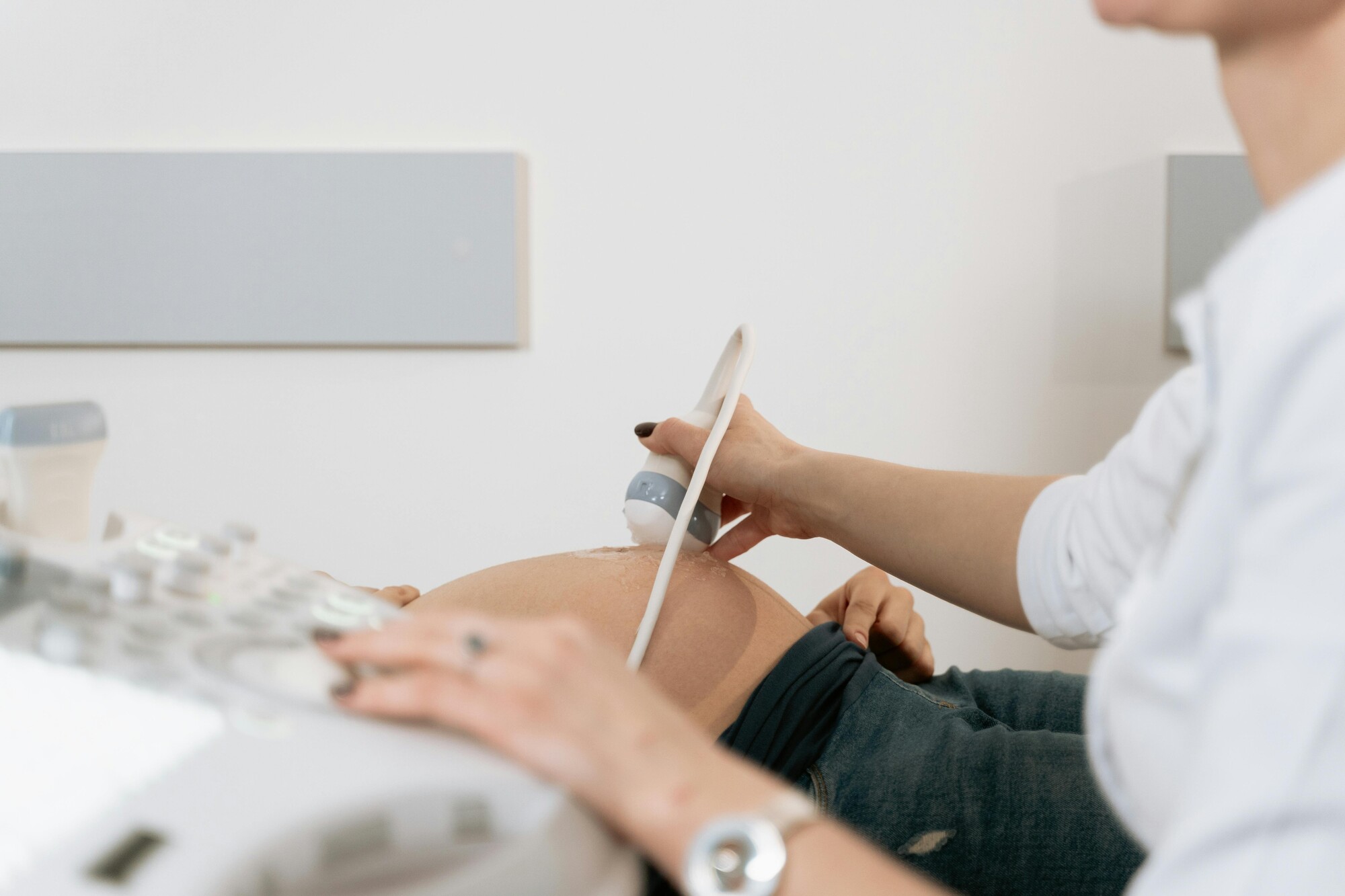1. Vaccinations and Pregnancy – Pros and Cons
1.1. General Special Features
Pregnancy is accompanied by a whole host of special features. This also applies to vaccinations. The immature immune system of babies, combined with the structure and function of the placenta, plays a key role.
1.1.1 Immunization for Newborns
The placenta forms the natural boundary between mother and child. Nutrient supply and the exchange of oxygen and CO2 occur through it. But, it is only partially permeable to antibodies, and this is important to know.
When humans become infected with a pathogen, so-called IgM antibodies are formed first – only later do so-called IgG antibodies appear. However, pregnant women's IgM antibodies cannot cross the placental barrier and thus reach the child. But IgG antibodies can, especially the further the pregnancy progresses.
When a pregnant woman comes into contact with a new pathogen for the first time, the mother's rapidly formed IgM antibodies cannot cross the placenta – and thus cannot protect the child. This makes vaccination prior to infection so important, so that maternal IgG antibodies are already available in an emergency.
This is also referred to as nest immunity. The immature immune system of the unborn or newborn child is "reinforced" by the mother's already mature antibodies. For this to happen, the mother must have already come into contact with the pathogen antigens at an earlier stage – ideally through a low-risk vaccination.
Nest immunity (also called borrowed immunity) exists from around the 20th week of pregnancy and can be further developed through breastfeeding even after birth. These antibodies are then primarily so-called IgA antibodies. However, even here, one can only "borrow" what the mother herself has. Timely vaccination therefore provides security.
Therefore, the timing of the vaccination is crucial for the vaccination question. But there is more to consider:
1.2. Problems and Risks
In order to adequately assess additional risks, it is also essential to understand the difference between live and inactivated vaccines (killed vaccines). Because not all vaccinations are the same. Rather, there are different types of vaccines that are fundamentally assessed differently for pregnant women.
The use of inactivated vaccines (killed vaccines) – such as those against influenza, tetanus, diphtheria, pertussis, and hepatitis A and B – is certainly possible during pregnancy. According to the Robert Koch Institute (RKI), "vaccinations against influenza and pertussis are even expressly recommended for pregnant women".
The situation is different with live vaccines, such as those against measles, mumps, and rubella (MMR) or varicella. These are discouraged during pregnancy. Women should also avoid becoming pregnant in the following month after receiving one of these vaccinations.
But there are numerous well-documented cases in which a woman received a live vaccination shortly before or during her pregnancy, which remained without an increased risk of complications. Thus, there is no real cause for concern for pregnant women in this scenario either.
1.3. Major Benefits when used correctly
This leads to a clear conclusion regarding vaccination decisions: Unborn and newborn children have immature immune systems and are therefore not adequately protected against numerous pathogens.
However, mothers can provide their offspring with the necessary "defenses" through nest protection. For this, it is crucial that the mother herself possesses the appropriate antibodies. Systematic vaccination according to the vaccination schedule recommended by the STIKO helps here. This way, nothing can go wrong with the timing issue.
And the STIKO vaccination recommendations also provide the necessary certainty when it comes to the important distinction between live and inactivated vaccines. This allows important live vaccines to be administered at a time when there is no pregnancy yet. This does not put pregnant women at risk, but – quite the opposite – provides precautionary protection should contact with the corresponding pathogen occur later.

2. Which vaccinations are needed before Pregnancy?
There are several reasons why it's important to get certain vaccinations before the start of a pregnancy. One of these is the so-called "nest protection," which requires IgG antibodies (see also above). But the vaccination must be administered well in advance.
Another aspect is all vaccinations that use a live vaccine. Live vaccines are by no means per se bad. Quite the opposite. They can stimulate the immune system extremely effectively and thus contribute to the sustained production of antibodies. Though they should not be administered during pregnancy.
But there are other reasons as well: Certain pathogens (such as hepatitis B or varicella) can be transmitted from mother to child, especially during birth, and can sometimes have serious consequences for the newborn. Birth itself is a highly sensitive period. Such cases can be effectively prevented with the help of a vaccination prior to pregnancy.
Pregnant women themselves have also been shown to have an increased risk of becoming particularly seriously ill from certain pathogens during pregnancy. These include, for example, the influenza viruses that cause flu, measles viruses with an increased risk of pneumonia – and, last but not least, more severe cases of COVID-19 caused by the SARS-CoV-2 virus. Here, too, the risk can be effectively minimized with timely vaccination.
2.1. STIKO Vaccination Recommendations for Women of childbearing Age
In general, women of childbearing age should ensure that any existing vaccination gaps are eliminated before becoming pregnant. If there are any uncertainties, it is worthwhile to carefully review the vaccination record together with the treating physicians (family doctor and/or gynecologist).
Catch-up vaccinations are recommended regardless of whether one's vaccination status is incomplete, completely lacking, or unknown. The following vaccinations should be considered:
2.1.1 Tetanus, Diphtheria, and Polio Vaccination (Boostrix Vaccination)
Tetanus, diphtheria, and polio are completely different diseases, but they are all caused by specific pathogens and, if infected, represent a true medical emergency. Fortunately, these diseases can be effectively prevented by prior vaccination. A necessary booster or catch-up vaccination is administered using a combination vaccine (often called Tdap-IPV or Boostrix vaccination), which ensures immunization against all three pathogens.
This is an inactivated vaccine. Ideally, vaccination should be administered before pregnancy occurs. But in cases of doubt, it can also be administered during pregnancy, as it is not a live vaccine. Typically, vaccination would then take place in the third trimester. If there is a risk of premature birth, this can be done as early as the second trimester (in which case, however, the Repevax vaccine would be used instead of the Boostrix vaccine).
2.1.2 Hepatitis B Vaccination
Since the hepatitis B vaccine is a killed vaccine, vaccination during pregnancy is in principle possible. Nevertheless, it is essential to establish the appropriate vaccination protection before the onset of pregnancy. This is especially true since the hepatitis B vaccination is one of the standard vaccinations that should ideally be administered in the first months and years of life. Therefore, vaccination during pregnancy is only advisable as a last resort and after a careful risk-benefit assessment.
2.1.3 Rubella Vaccination
Vaccination against rubella is usually administered as a combination vaccine, which, in addition to rubella, also protects against measles, mumps (MMR vaccine as a three-dose combination), and varicella (MMRV vaccine as a four-dose combination).
This is a live vaccine in which the corresponding pathogens have been weakened (attenuated), meaning they cannot cause infection in people with an intact immune system. However, since babies' immune systems are still immature, no risk should be taken at this point. Thus, this vaccination must be administered before pregnancy. Since, like the hepatitis B vaccination, it is one of the standard vaccinations, this immunization should be administered anyway, regardless of a potential desire to have children.
2.1.4 Measles Vaccination
The measles vaccination is similar to the rubella vaccination (see 2.1.3.). But while rubella can typically result in birth defects in newborns, the risk from measles is somewhat different: Pregnant women who have measles have an increased risk of developing pneumonia. Measles infection can also lead to premature labor, premature births, and unintentional abortions. The best way to effectively prevent all of these risks is therefore timely primary immunization through vaccination – long before pregnancy even occurs.
2.1.5 Varicella Vaccination
The same principles apply to the varicella vaccination as to the rubella vaccination (see 2.1.3.).
However, varicella is a major concern among pregnant women because infection of the baby during pregnancy or birth can lead to serious complications, even death. Since this vaccination is also proven and safe, timely primary immunization before pregnancy effectively protects against an unwanted and often serious infection.
2.1.6 Coronavirus Vaccination
Although the coronavirus vaccines approved in Germany are not live vaccines, vaccination before becoming pregnant is still advisable. You can find the most important background information in our article on coronavirus vaccination and pregnancy. Since the coronavirus vaccination for pregnant women is still relatively new compared to other vaccinations, you can find all important updates on the Robert Koch Institute's FAQ page.
3. Which Vaccinations are needed during Pregnancy?
The STIKO recommends the following general rule: All live vaccines are "contraindicated" during pregnancy, i.e., prohibited. Inactivated vaccines (killed vaccines), on the other hand, are considered safe for the pregnant woman and the fetus and can be administered – if appropriate.
But this should always be examined on a case-by-case basis and subject to a careful risk-benefit analysis. Ideally, the relevant vaccinations should have been administered before the start of pregnancy. If this has not happened, the administration of an inactivated vaccine (killed vaccine) during pregnancy – starting from the second trimester – is in principle possible.
The main reason why this should only be done from the second trimester onwards is the following: involuntary abortions are relatively common in the first trimester anyway. Vaccination would have no effect on this. Many affected individuals would understandably, albeit incorrectly, see the vaccination as the reason due to the temporal connection (not causality!). Thus, vaccination in the first trimester is only advisable in particularly urgent cases.
Three pathogens currently require separate consideration. In these cases, vaccination during pregnancy may be particularly beneficial:
3.1. Flu Vaccination (Influenza)
Influenza infection during pregnancy has been shown to be associated with increased risks. These include the risk of maternal pneumonia, an increased likelihood of hospitalization or even intensive care, and an average increase in mortality. And the risk of unintentional pregnancy loss is also increased.
Since influenza vaccination during pregnancy reduces the maternal infection rate by approximately 30 to 70%, the STIKO (German Institute for Influenza and Immunology) expressly recommends this vaccination for pregnant women. The flu vaccination should be administered starting in the second trimester and can thus effectively prevent a severe course of the disease.
If the pregnant woman has an underlying medical condition that poses a particular risk, vaccination may be advisable even as early as the first trimester. As with any vaccination, this should be discussed with the treating physician.
3.2. Coronavirus Vaccination
Although the coronavirus vaccination should ideally be administered before the onset of pregnancy (see 2.1.6.), if this has not been done, the vaccination can at least be administered later, starting in the second trimester. In addition to the increased risk for pregnant women of experiencing a more severe course of COVID-19 during pregnancy, the protection of the baby is also a priority. Here, too, the child benefits from the so-called nest protection (see 1.1.1.).
It has now been proven that maternal antibodies against the SARS-CoV-2 virus are passed on to the unborn child via the placenta and umbilical cord, and to the newborn via breast milk. Important background information on this topic can be found in our article on coronavirus vaccination and pregnancy.
Since the COVID-19 vaccination for pregnant women is still relatively new compared to other vaccinations, you can find all important updates on the Robert Koch Institute's FAQ page.
3.3. Whooping Cough Vaccination (Pertussis)
According to the STIKO (German Institute for Disease Control and Prevention), pregnant women are also explicitly recommended to be vaccinated against whooping cough. The vaccination recommendation applies to all pregnant women from the 28th week of pregnancy onwards – regardless of previous whooping cough vaccinations.
This is because vaccination protection against pertussis sometimes wears off quickly. For pregnant women at risk of premature birth, the vaccination recommendation even applies as early as the second trimester.
Close contacts of the baby who last received a pertussis vaccination more than 10 years ago should also be vaccinated. This should be done at least four weeks before the expected due date. For more detailed information on this topic, see our article on pertussis vaccination and pregnancy.
The contents of this article reflect the current scientific status at the time of publication and were written to the best of our knowledge. Nevertheless, the article does not replace medical advice and diagnosis. If you have any questions, consult your general practitioner.
Originally published on







